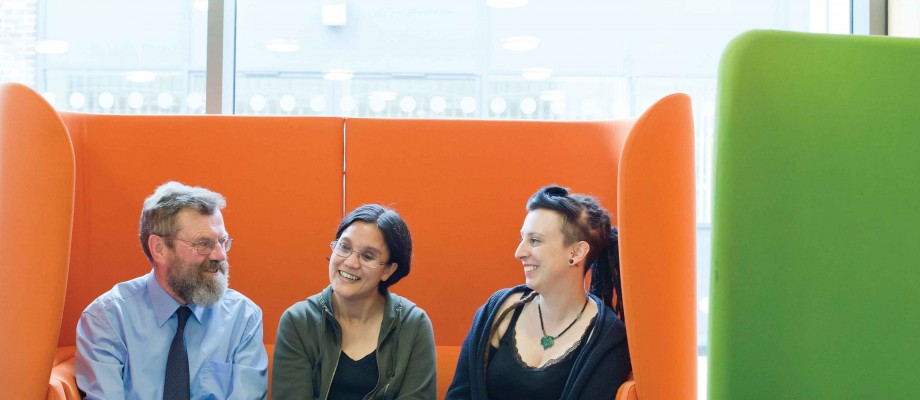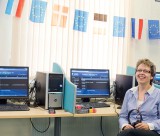
Overcoming barriers, together
November 3rd, 2014
Calibre is a personal leadership and development programme for University staff with disabilities*. Among the programme’s graduates are Stephen Hodkinson, Professor of Ancient History, Susan Inness, a Library Support Assistant and Sarah Thomas, a Model Design Technician with the School of Architecture. Here they discuss Calibre and their experiences of working at the University.
What is Calibre’s purpose?
Susan Inness, who has a brain injury and impaired vision: “What the course showed is that social barriers — the environment we work in — cause problems, not our impairment. We must chose to have control over these barriers by using the right words and speaking to the right people so we can overcome them.”
Stephen Hodkinson, who suffered a traumatic brain injury in a cycling accident: “A key part of Calibre is showing that disabled staff, whatever their positions, can exercise personal leadership to effect positive change in the workplace and that the experience of disability gives staff particular insights, skills and abilities unavailable to non-disabled staff — we have something distinctive to contribute.”
What are the challenges you face at work?
Sarah Thomas, who has Attention Deficit Hyperactivity Disorder (ADHD): “People can’t see my [disability] — and they also struggle to relate it to an adult woman. Along with the ADHD I have Sensory Processing Disorder — I struggle to process sensory input. My biggest problem is that I burn myself out so quickly. Also medication can be an issue when they change it or it’s not agreeing with me physically.”
Susan: “There are little instances where staff just don’t get it and they say the wrong things without thinking. They don’t know how to interact with my disability — they’re ok interacting with me as a person but not the disability side of me as a person.”
Stephen: The effects of my injury have been more subtle — reduced attention span and short term memory and greater difficulty in holding together multiple ideas. By adjusting ways of working, I’ve been able to continue working effectively — I coordinated my unit’s REF submission! — but original research is the biggest challenge. I have a period of study leave coming up aimed at completing my return to research.”
Can declaring disability be an issue?
Sarah: “It wasn’t until I came here that I declared I was disabled and was able to say ‘look, sometimes I just need one day off — I can’t leave the house because it hurts the senses too much and I just can’t manage it’. It’s a relief having the support I need — it means I have less time off in the long run because I feel less pressured. I still get tired but I don’t get as stressed.”
Susan: “A lot of disabled people feel isolated, don’t feel confident enough to say ‘I am disabled, I need this support’. There are a lot of people out there we still don’t know are disabled.”
Stephen: “Since becoming disabled I’ve discovered other staff who like me have acquired a disability, but unlike me have not declared it. I think there’s a fear of stigma and also uncertainty whether declaring your disability will have a positive rather than negative outcome. Therefore it remains a hidden problem.”
Should the University be doing more?
Stephen: “Whenever considering new policies or procedures, decision-makers need to think — ‘Are there challenges this might pose for staff with various kinds of disabilities and how do we build in anticipatory adjustments to overcome barriers the policy may cause?’ It’s very cost-efficient — it saves a lot of individual staff negotiation because many of the required adjustments are already in place. It also saves the uncertainties managers often face — ‘Should I ask this disabled member of staff about his or her particular needs, or will they be offended if I raise the issue?’”
Susan: “When I first came here in 2006 I didn’t have a clue about the support I was going to get. There was no equipment or guidance. I was constantly on the internet trying to find out who I talk to. I hope things would be better for someone in a similar position starting now.”
Stephen: “The University has a very strong support service for disabled students, but it doesn’t have a single staff disability officer or advisor and that’s a big gap. S/he could act as a liaison between disabled staff and line managers and provide informed advice to policy-makers to help the University meet its legal duties under the 2010 Equality Act.”
Can Calibre help?
Stephen: “The University’s Strategic Plan has a specific target for increasing the proportion of staff with declared disabilities. In promoting disabled staff leadership, Calibre is assisting the University to meet its strategic objectives.”
Susan: “Calibre is a step in the right direction but we didn’t have non-disabled staff on our course — it would have been useful to see disability from their perspective, too.”
Sarah: “It helps by encouraging us to put forward what we need in a positive way and work with the University to get support — that’s beneficial for all.”
*“Just under 2% of University employees have declared a disability…still some way short of the 2014/2015 target of 4% referenced in the 2010-2015 University plan and will therefore require some focus over the coming years. The University has shown a slight improvement from 2011 in reducing the ‘Not known’ category from 6.7 to 5.7%.” — the University’s Annual Diversity Report 2013
Read the report here
Calibre is a three-day course open to any staff with a declared disability. It is supported by the University’s Disabled Staff Network (DSN) and managed by the Professional Development Unit.
Participants in Calibre took part in a graduation ceremony on October 22. Registrar Dr Paul Greatrix heard how the course aims to empower disabled staff to overcome the challenges they face and help develop strategies to improve diversity in the University workforce.
For more information on Calibre, contact Katharine Carter, Professional Development Officer,
e: katharine.carter@nottingham.ac.uk
Gillian Coburn, DSN coordinator said: “Stephen, Susan are Sarah are all members of the Disabled Staff Network. Staff with disabilities can sometimes feel isolated and our meetings are a great place to share experiences and enjoy friendship and support from colleagues across the University. We’re also an important forum that helps influence University policy.”
For information on the Disabled Staff Network
e: gillian.coburn@nottingham.ac.uk
Tags: Calibre, Disabled Staff Network, Disabled Staff Network coordinator, Gillian Coburn, Katharine Carter, Model Design Technician, Professional Development Officer, Professor of Ancient History, Sarah Thomas, School of Architecture, Stephen Hodkinson, Susan Inness
6 Comments
Leave a Reply
Other Issue 80

New research from the British Election Study (BES) has found that contrary to popular perception, only […]

Foreign Language TV service a click away
Students and staff can now use any University-networked PC to watch 50 satellite channels broadcasting in […]


November 13th, 2014 at 8:39 pm
Robert Gach
Huge congratulations to all the people involved in CALIBRE at University of Nottingham.
You’ve started a ball rolling.
I’d like to comment that Depression is now classed as a ‘disability’.
Declaring depression will be immensely challenging for an individual, by it’s very nature the stigma can be produced ‘within the individual’.
Our country is really trying to help depressed people.
See national campaign at
http://www.time-to-change.org.uk/
April 28th, 2016 at 11:37 am
Robert Gach
After nearly one and a half years (since my comment above Nov 13th 2014) I’ve started the Nottingham Calibre 2016 course yesterday on Wednesday April 27th 2016. That ball is definitely gathering momentum….
April 28th, 2016 at 8:42 pm
Katherine Thomas
This sounds a very exciting programme. Such a positive approach to empower and enable people with depression and other disabilities in the workplace. Keep the ball rolling
April 29th, 2016 at 10:40 am
Rob Thomas
Hope this event goes well. It is incredibly valuable to raise awareness surrounding issues of disability, especially the often ‘hidden’ disability surrounding mental health.
May 12th, 2016 at 4:19 pm
Pam Tegerdine
At long last, staff with disabilities are considered as important as students with protected characteristics. They have so much to offer but in the past the stigma of their disabilities, including mental health issues,has often held them back from being all they can be.
Calibre is hopefully the start of something big, opening up dialogue about the stigma people face at work,if and how to’declare’and how they can operate as effective members of a team. Diversity is a strength and we can all learn from each other.Course members can go out into their working environments,equipped to help themselves and others.Excellent!
May 6th, 2017 at 3:25 pm
Robert Gach
My oh my how time flies…..
I successfully completed the CALIBRE program 2016. My Calibre project was titled ‘On overcoming barriers to the disclosure of ‘hidden’ impairment in the workplace’.
I’m an active member of University of Nottingham’s Disabled Staff Network (all communications by email welcome at dsn@nottingham.ac.uk) and a Peer to Peer Disability Support Adviser.
I’m very glad that I attended the CALIBRE course.